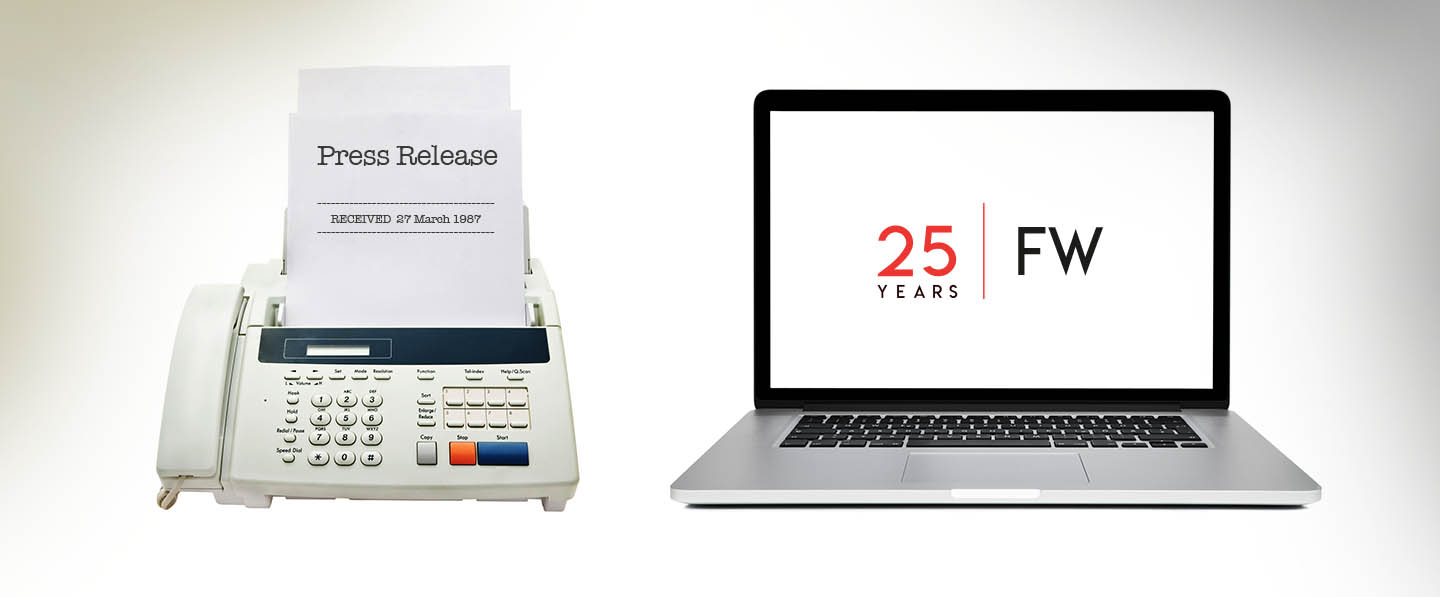
25 years…and a lot of change
Anniversaries are usually a time for celebration, and often a time for reflection. This year, we celebrate 25 years of Freshwater and its journey through a period that has transformed the communications industry beyond recognition.
By our chief executive, Angharad Neagle
A lot happened in 1997: Cool Britannia was in full swing, Labour swept to power at Westminster, Wales voted for devolution, and the whole country was thrown into mourning when Princess Diana died in a car crash in Paris.
For my part, I was studying for a journalism degree at the University of Wales College Cardiff, while just a few miles up the road in Caerleon, Steve Howell, a former BBC journalist, set up the business that would become Freshwater in his back room with a fax machine as his technological pride and joy.
If we had known how much change we would have to understand and embrace over the next 25 years, we probably wouldn’t have believed it.
My first job, in 1998, was as a press office assistant with South Wales Police. Email back then was a complete novelty. If you were one of the lucky ones, there might be a computer in the office that had a generic corporate email address – which you could use, if you were allowed and, more importantly, knew how to.
Instead, for those of us issuing press releases, we’d spend hours standing at the fax machine, punching in the numbers to the journalists we wanted to reach. That was all well and good if you only wanted to issue copy. But if you had a picture to go with it, you would have to ask the press to come to the front desk and take a photograph…of the photograph.
For those working in agencies, you’d have to place your pictures (with captions sellotaped to the back) in hard back envelopes and make sure the office junior got them to the post office by 5pm. If you missed the post, then you would drive to what was commonly known as the ‘side lodge’ at Thompson House, the Western Mail and Echo offices in Cardiff, to drop off a wad of envelopes to the ever-patient porter.
And if that doesn’t sound archaic enough – we didn’t have mobile phones. They did start creeping in during the late 90s, but usually it was one for the office and you’d have to share it. Certainly, no-one had their own. And if you were on call, you’d have a pager, which you’d dread going off.
We relied on what we now call ‘traditional’ media to get our story out, and we were a slave to print deadlines. Hard copy newspapers meant there was no updating a story until the next day once it had gone to press. For those of us in PR, if we didn’t like what we saw, we’d tell ourselves “it will be fish and chip paper tomorrow.” Nowadays, we’ve lost that privilege. Living in a digital world, bad news is there for all to see, for as long as we choose to search for it.
It’s heart-warming to remember those days if only to see how much has changed. Over the past 25 years, advances in digital technology mean that we now have a host of channels at our fingertips to communicate with our customers, clients, stakeholders and staff.
We can tell our story, and those of our clients, at the tap of a button through the myriad of social media platforms that exist. Videos are no longer big-budget productions. We can photograph events and share the images instantaneously, without even leaving our seat. We have access to data that allows us to target communications with a precision that we once only dreamed of, making the evaluation of an investment much more exact. In short, communications has become smarter, faster, integrated, multi-channel, more streamlined and more targeted.
But even though the channels, methods and means of communication may have changed beyond recognition, the fundamentals haven’t. Content is, and always has been, king. You need to have a good story – and you need to tell it well. And that principle rings as true now as it did in 1997.
It’s interesting to think back to the old days, but I’m also reminded of the old adage – plus ça change, plus c’est la même chose. Communication is still about understanding and influencing people.
This article featured in the Western Mail on 27 June 2022
